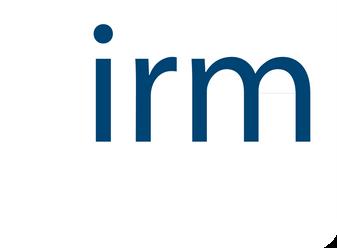Training Brochure



Risk isn’t just for risk managers
Risk managers have never been more in demand, upskill yourself and become a valued asset to your organisation with an IRM Qualification.
Find out more






Introduction
The Institute of Risk Management (IRM) is the leading professional body for Enterprise Risk Management (ERM) We provide globally recognised qualifications and training, publish Thought Leadership and run insightful events open to both our members and the wider public, all of which are underpinned by our professional standards, defining the requirements risk managers need to meet
By these means, we help organisations and individuals build excellence in risk management and raise awareness of risk across society so that they protect value and take advantage of opportunity
The Institute of Risk Management (IRM) was founded in April 1986 as an awarding organisation to meet the growing demand for a diploma-level qualification in risk management. We now deliver general and specialist training courses, events, Enterprise Risk magazine and a variety of other resources to underpin the development of risk professionals across the world.
Training Courses
All of our courses are highly engaging and interactive. With practical case studies and exercises, you will use valuable tools and techniques to assess different aspects of risk management which you can put to use straight away upon returning to work
Our courses are benchmarked against the international standards of ISO 31000 You will gain CPD hours and a certificate of attendance for each course you attend
Trainers
Each trainer is an IRM approved trainer, this means they have gone through a lengthy assessment and evaluation process to ensure their skill set and experience is broad, extensive and relevant to each subject matter
Our trainers are highly skilled, personable and have an indepth knowledge of their subject field. They are very hands-on and will help you apply the learning materials to your individual needs.
All training courses available through the IRM can be found on our website If you would like to discuss any courses in particular please contact our training team at training@theirm org
Course Structure
All IRM courses are based on the concept of Enterprise Risk Management (ERM) The courses are set to the international standards of ISO 31000 and each course is aligned to a specific part of the ISO framework to help you identify the most suitable course
With training courses covering a wide range of ERM topics, we can help build your career as a risk professional All courses are delivered by industry experts so you can immediately apply the latest best practice
As well as being practical and interactive, the courses allow you to log CPD hours and some offer accreditation Course bookings can be made online or you can complete the attached form and get in touch directly with our training team to book your place
Please note, some courses book out months in advance and places are allocated on a ‘first come first served basis
ISO 31000 RISK TRAINING COURSES
Principles of Risk
Context and Objectives
Risk Assessments
Fundamentals of Risk Management (FoRM)
Risk Essentials Masterclass
Risk for Healthcare Risk Practitioners
Certificate in Risk Management for Insurance
Climate Change Risk Management
Risk Essentials Masterclass
Strategic Risk Masterclass
Risk Management in Practice
Crisis Management
Financial Crime Risk Management
Fundamentals of Operational Risk Management
Managing Contract Risk
Practical Risk Appetite and Tolerance
Project Risk Management
Supply Chain Risk Management
Effective Risk Registers and Assessment
Fundamentals of Solvency II
Action, Monitoring, and Review
Communication and Consultation
CQRM – Certified in Quantitative Risk Management
ESG Fundamentals and Risk Quantification
Mastering Key Risk Indicators
Enterprise-wide AI Risk Management (EW-AiRM)
Risk Reporting
Risk In the Boardroom
Reputational Risk
Newly Updated

Fundamentals of Risk Management (FoRM)
Course Overview
Managing risk is an inherent part of delivering organisational success today This course covers the fundamentals of Enterprise Risk Management in a dynamic and interactive learning environment The course will use the theory and practice of risk management in-line with international standards (ISO 31000) and industry best practice
The course uses a combination of case-studies, practical exercises and current affairs to bring material to life Our trainers will bring you a wealth of industry expertise On completion of this course you should have a solid understanding of how effective risk management can benefit your organisation
Learning objectives
Setting the scene
Understanding risk maturity
Understanding the risks around us
What is Risk?
Learn how to define risk
Understanding how risk management can be used to both maximise opportunities and minimise threats
Understanding the principles and processes of risk management
Establishing the attributes of effective risk management
Context and Objectives
Understanding the purpose and scope of risk management
Establishing the relevant risk framework including roles & responsibilities, policies and appropriate guidance
Develop an awareness of risk appetite
Risk Assessment
Gain and awareness of identification techniques
Assessing risk and selecting appropriate actions and controls using key tools, such as risk registers, risk bow-ties and risk matrices
Practically applying risk assessment using case studies to identify and analyse
Risk Action
Understanding risk treatment plans and smart actions
Recognising control effectiveness
Awareness of business resilience
Monitoring, Communication and Reporting
Techniques to keep the risk management process alive through effective monitoring and reviewing
Develop and appreciation of effective risk reporting
How to effectively communicate risk to all levels of your organisations and to external stakeholders

Sarah and Kate were brilliant and I thoroughly enjoyed this session, which I was nervous about as I am completely new to this topic.
You can really see what experts they are in this field and they delivered it in an engaging, relatable and fun manner!
Thanks for a great first experience in the world of risk management training.
- Laura Tipton

Learning objectives
Explain the core principles and objectives of Solvency II and their practical applications
Identify key assumptions and parameters driving the regulatory solvency position
Assess how strategic business decisions such as new product launches, M&A, and market expansion impact solvency in the short and long term
Who should take this course?
Business leaders navigating regulatory impacts
Junior actuaries and actuarial trainees
Assurance providers, including internal and external auditors
Capital modellers responsible for solvency calculations
Risk managers overseeing regulatory and financial risks
Actuarial consultants supporting work related to Solvency II
Key Benefits of Attending?
Learn key methodologies for risk quantification, including the standard formula and internal models
Demystify technical concepts such as risk horizon, risk measure, risk margin, diversification, and adjustment through practical examples
Understand how Solvency II aligns with other frameworks, including IFRS 17, ICS, RBC, and Solvency UK
Engage in best practice discussions and network with professionals from diverse backgrounds
Insights from experienced practitioners with expertise in Solvency II
Duration
1 Day (Virtual) - 4 CPD Hours

Risk Essentials Masterclass Course Overview
This masterclass is based on the content of our four most popular and practical courses: the Fundamentals of Risk Management (FoRM), Risk Management in Practice, Practical Risk Appetite & Tolerance (PRAT) and Effective Risk Workshops and brings them into a tailored masterclass of risk management essentials
Participants will develop a comprehensive and in-depth understanding of risk management through this intensive masterclass Delivered over five highly interactive days, the program incorporates internationally recognised frameworks, practical models, and hands-on participation in a live case study to enhance your learning experience
Learning objectives
Understanding the differences between Appetite, Tolerance, Capacity and Universe Methods to create Appetite statements that are effective at both a strategic and operational level (defining “expected” so everyone in the organisation can “spot deviations from the expected”)
Gain a broad understanding of ERM and the role it plays in organisations
Learn about the function and role of the five main stages of the risk framework
Understand organisation objectives, the drivers, KPI’s and KRI’s to help identify risk
Learn about risk appetite and statements, and how risk culture can define your risk maturity and appetite
Examine risk identification techniques, and ways to present them to different stakeholders while identifying effectiveness and control
Risk controls and how to respond; creating business cases for new controls
Risk assurance: Assuring stakeholders, horizon scanning and risk and audit
Who should take this course?
Risk Managers & practitioners
Executives, Heads of Departments & CROs
Student studying the certificate & diploma
Risk Champions & facilitators
Internal auditors
HR Managers & IT Risk Managers

Climate Change Risk Management Course Overview
Join The Institute of Risk Management and Imperial College London in our revamped cutting-edge, interactive online training program on Climate Change Risk Management Navigate the complexities of a changing climate, evolving regulations, and emerging opportunities with our twotiered course offering or the combined Masterclass
Climate Change Risk Management: Fundamentals
Embark on a journey to understanding why climate change matters to you and your organization Uncover the principles of climate change risk management, and learn how to implement effective strategies using the latest tools and techniques Discover the critical connection between climate change and sustainability, and prepare to meet the evolving expectations of regulators and stakeholders
Climate Change Risk Management: Advanced
Dive deeper into the world of climate change risk management Unravel the intricacies of emissions debates, carbon accounting, and border adjustments Master scenario analysis techniques to inform decisionmaking, learn to spot and avoid greenwashing, and stay ahead of reporting requirements Transform your understanding into meaningful actions that lead to real change
Learning objectives
Climate Change Risk Management: Fundamentals
On completion of the Climate Change Risk Management Fundamentals course, participants will be able to:
Comprehend Climate Change Science: Develop a foundational understanding of climate change science and appreciate its global implications
Understand Climate Change Risk Management: Gain knowledge on climate change risk management, including strategies for identifying risks and opportunities and making informed decisions
Familiarise with Regulations and Standards: Become acquainted with key climate change regulations such as TCFD (Task Force on Climaterelated Financial Disclosures) and ISSB (International Sustainability Standards Board) and understand the evolving expectations for organisations
Master Tools and Techniques: Build confidence in employing various tools and techniques for climate change risk management including context understanding, scenario analysis, and setting metrics and indicators
Integrate Climate Change Strategy into Sustainability Goals: Learn how to establish and integrate a climate change strategy into broader sustainability and Environmental, Social, and Governance (ESG) objectives
Learning objectives
Climate Change Risk Management: Advanced
On completion of the Climate Change Risk Management Advanced course, participants will be able to:
Analyse Regulatory Compliance and Industry Performance: Critically analyse changing regulatory requirements and evaluate the performance of different organisations in meeting these requirements
Deep Dive into Emissions Management: Develop an in-depth understanding of emissions, including the concepts of Net Zero and Carbon Neutral, carbon trading schemes, and carbon accounting
Conduct Advanced Scenario Analysis: Acquire skills in developing both qualitative and quantitative scenario analysis and learn how to establish financial materiality thresholds and link them to risk appetite and tolerance
Enhance Decision-making Skills: Enhance decision-making capabilities by understanding how internal and external stakeholders influence climate change strategies and learn how to make meaningful decisions that lead to tangible changes
Identify and Combat Greenwashing: Gain proficiency in identifying greenwashing tactics and develop strategies to prevent and combat greenwashing within an organisation
Who should take this course?
Senior risk professionals
Business leaders (CEOs, heads of function, senior managers)
Assurance providers, e.g., internal and external auditors
Non-executive directors (particularly those with responsibility for audit and risk)
Professional advisors wishing to provide more expert support for their clients' market
Duration
Masterclass: 4 days - 16 CPD Hours
Fundamentals: 2 days - 8 CPD Hours
Advanced: 2 days - 8 CPD Hours
View the next sessions here
Well designed, professional and internationally recognised approach to risk management training that aligns with the needs of modern businesses.
- Vince Hayler Change and IT Risk Specialist, Old Mutual Wealth


Certificate in Risk Management for Insurance Course Overview
This course has been jointly developed by IRM, ESA Business School and Corporate Risk Management Institute (CRMI) and provides participants with a general understanding and overview of Risk Management Frameworks implemented in the insurance industries in line with best practices and international standards
Taught by practising professionals with strong academic backgrounds, the course will allow participants to identify, assess, measure, monitor and mitigate both potential financial and non-financial risks in a practical way using relevant industry case studies Also, the course covers significant parts of the compliance and regulatory requirements based on participants’ location
After completing the certificate, participants will have course materials that they can refer to, to help manage the critical risks faced by insurance and reinsurance companies
Learning objectives
Understand the fundamentals of risk management within the insurance and reinsurance industry
Learn how to use key techniques to identify, analyse, and respond to a variety of risks, both internal and external to companies using realworld examples
Evaluate the impact and rationale for designing an effective risk management strategy aligned with an organisation’s corporate governance principles and regulations
Develop the skills to create your Own Risk and Solvency Assessment (ORSA) reports that are tailored to the insurance industry, along with recovery resolution plans
Who should take this course?
Risk Managers, Internal Auditors, and Legal and Compliance professionals within the insurance and reinsurance industry
Consultants and Regulators looking to specialise in Enterprise Risk Management within the insurance and reinsurance sector
Stakeholders (Board Members, Executive Management, and Underwriters) involved in the formulation, implementation, and enhancements of risk management frameworks within an organisation
Applicants looking for a career in Governance, Risk and Compliance (GRC) department within the insurance and reinsurance industry
Duration
7 Modules For

Learning objectives
The Risk for Healthcare Risk Practitioners course aims to enhance attendees’ understanding of what effective risk management looks like and how risk professionals can proactively support healthcare organisations to take a more strategic and forward-looking approach to managing risk
Designed and developed to equip healthcare risk personnel to take more of a partnership approach - enabling them to better support risk owners and operational and executive managers to effectively manage their risks
By the end of the course, attendees will:
Develop a deeper understanding of the principles of risk management
Understand how to identify, assess and prioritise risks in the context of achieving objectives
Support risk owners to understand what risk actions can be taken to manage risks
Develop an understanding of how people react to risk situations
Build confidence to proactively support risk owners and managers by providing effective business support in all areas of risk management.
Who should take this course?
Healthcare risk practitioners
Practising or aspiring managers and leaders who are in decisionmaking roles in healthcare
This course is for those who do not hold a recognised risk qualification
Duration
7 Days (Virtual + In-person)
This course consists of nine half-day modules delivered over seven full training days
Fundamentals of Operation Course
Overview
Operational risk management outcomes on the efficiency
organisation This course pr understanding of the fundam guided by internationally respec by up-to-date learning resources
Operational Risk by Simon A practical insights to help par organisational management
Learning objectives
On completion of this course, participants will be able to:
Explain the value of operational risk for organisations and their stakeholders
Apply the latest best practices to enhance a wide range of operational risk management tools and processes
Improve the integration of operational risk processes into the everyday operations of an organisation
Develop plans to build a more agile and resilient organization
Who should take this course?
Professionals seeking to understand operational risk management and its role in their business area.
Those new to risk management who want to build confidence in operational risk practices.
Individuals aspiring to enter the risk profession
Experienced professionals looking for a refresher to update and enhance their knowledge
Students preparing for the International Certificate in Operational Risk (iCorm) qualification
Professionals who need to understand the relationship between operational risk management, enterprise risk management, and audit/compliance functions
Delivered over two 4-hour online sessions, the course covers:
Core concepts of risk and operational risk management and how they are effectively managed, monitored and reported
Exploring an organization’s risk culture to assess its preparedness for operational risks
Examining risk strategy and its role in managing operational risks. A brief overview of risk appetite and its relevance to operational risk management.
Duration
2 Days (Virtual) - 8 CPD Hours


ncing the organisation's how risks are identified h general management hilosophy
workshop on how to set amework You already e next step is to equip ortunities for innovation del
e barriers stifling risk Packed with a series of ys of making risk in your your organisation.
ment process which are:
Learning objectives
Creating a robust action plan for an embedded ERM framework
Enabling the board to anticipate and handle risks in meeting strategic objectives
Identifying behaviours that support Enterprise Risk Management
Developing your own risk management tools, maturity models and risk appetite models
Who should take this course?
Heads of Department
Risk Managers
HR Managers
Chief Risk Officers
Duration
2 Days (Virtual) - 8 CPD Hours

Strategic Risk Masterclass Course
Overview
The Strategic Masterclass focuses on using risk management to take more risks in a controlled way to gain a competitive advantage
The content will give you a grounding in risk appetite and tolerance, risk culture, strategic risk and control effectiveness You will also gain a good understanding of Resilience, Agility and Sustainability and how they relate to the running of your organisation
Over the course of the 3-day workshop, you will consider your strategic opportunities and their associated risks You will weigh these options and risks against your existing resilience and agility You will weigh up what additional capabilities and controls would be needed to pursue these opportunities in a measured and balanced way
Learning objectives
Gain an understanding of how risk management can be used to achieve a competitive advantage
Ability to identify how resilient and agile the organisation is in the face of constant change
To develop an understanding of the risks associated with the organisation adapting to sustainability targets
Examine strategic risks and how they can impact your organisation
Learn tools and techniques to measure and monitor control effectiveness
Identify the short-term “clear and present danger” risks; their mediumterm knock-on effects and their long-term existential challenges
Who should take this course?
Senior risk professionals
Business leaders (CEOs, heads of function, senior managers)
Assurance providers, e g , internal and external auditors
Non-executive directors (particularly those with responsibility for audit and risk)
Professional advisors wishing to provide more expert support for their clients' market
Duration
3 Days (Classroom) - 21 CPD Hours
Newly Updated

Practical
Risk Appetite and Tolerance Course Overview
Risk appetite defines the boundaries of risk an organisation accepts when setting targets and making business decisions It has a crucial role in effective risk management but is a complex area which involves balancing competing interests IRM's two-day training explores the amount of risk your organisation is willing to seek or accept to achieve its objectives
We give you the theory behind risk appetite thinking and the hands-on skills and practical knowledge to build an effective risk appetite framework to benefit your own organisation You will learn precisely how to analyse risk appetite and the tools to implement this key aspect of risk management in your role
Learning objectives
Explain the difference between risk appetite, risk tolerance and thresholds
Develop a risk appetite framework and supporting governance processes
Develop risk appetite metrics and trigger levels for action
Customise and use risk appetite within your organisations ERM framework
Establish Key Risk and control indicators based on the risk appetite metrics
Gain board and executive level buy-in for formalising the organisations risk appetite
Who should take this course?
Organisation leaders & managers who want to understand how a positive approach to risk adds value
Risk managers who are charged with risk framework implementation
Auditors who have responsibility to provide assurance to the organisation on risk management
Board members who set risk appetite and tone from the top in their organisation
Duration
2 Days (Virtual) - 8 CPD Hours
Well designed, professional and internationally recognised approach to risk management training that aligns with the needs of modern businesses.
- Vince Hayler Change and IT Risk Specialist, Old Mutual Wealth
Learning objectives
How significant risk culture and control are to organisations, and the different levels of risk culture
The external and internal factors which can affect the risk culture of an organisation
Reviewing and evaluating various approaches to monitoring risk culture, including the use of surveys and metrics
Different regulatory approaches to risk culture, including HSE, financial services and financial reporting
Who should take this course?
Risk Practitioners
Risk Managers
Operations Managers
Heads of Department
Chief Risk and Finance Officers
Chief Executive Officers
Duration
1 Day (Virtual) - 5 CPD Hours

Dynamic and engaging. The content was balanced between delivering rich insights and allowing sufficient flexibility to adapt to participants objectives.
-
Adnana Manda Head of Risk Partners Society for Worldwide Interbank Financial Telecommunication

d suppliers as essential and tion. Third parties and supply many cases continue to be, n an organisation's ultimate
y of the relationships that now boundaries, combined with ny, organisations face greater s in our globalised world While ficial to an organisation on so ts can expose an organisation hich increase the level of risk, with the potential to adversely
ms, staff and outside support s is key in strengthening our
Learning objectives
Setting the context for third-party risk management including types of risks such as Cyber & Digital, Compliance & Regulatory, Financial Crime, alignment to third-party management and enterprise risk management
The challenges and pitfalls of managing third-party & supply chain risks - operational, strategic & cultural
Digitisation of Supply Chains - risk & opportunities
ESG and its impact on Supply Chains
Supply Chain / Third-Party Risk Framework Overview
Third-Party Risk Governance – including strategic risk management and resilience, risk response options, operating models and monitoring & reporting
Assessing third-party risks and controls – process requirements, tools and techniques
Third-Party Risk Management and the Procurement Lifecycle – from onboarding to exit
Moving from risk to resilience
Managing third-party risk management information
Who should take this course?
This course will be of benefit to risk managers, procurement managers, contract managers and business line managers who interact with thirdparty vendors and need to recognise the potential risks within the legal agreements and the services they provide, especially in situations where an entire business function is outsourced, multiple functions are consolidated to a single provider, the provider subcontracts and/or the provider works directly with the organisation’s customers
Procurement Professionals
Supply Chain Professionals
Ethics & Compliance Professionals
Risk Management Professionals
Business Continuity Professionals
IT Security Professionals
Legal Professionals
Environmental, Health & Safety Professionals
Quality Assurance and Management
Corporate Social Responsibility & Accountability Professionals
Individuals with third-party management, ownership, or oversight responsibilities.
Note – Course Delivery, Duration and CPD
This course is delivered in LIVE and REAL-TIME public training sessions, with a cohort of peers During these sessions, you will be able to connect and interact with your peers and the IRM expert trainer, in the medium of a virtual classroom
In addition, all training material will be provided, ensuring that the attendee can continue their learning journey, wherever they choose
Duration
2 Days (Virtual) - 8 CPD Hours


Learning objectives
Develop an understanding of the key elements of crisis management as it applies to all industries
Understand the principles, processes and phases of crisis management
Learn about the differences in decision-making during times of crisis from business as usual (and tools to assist)
Gain an understanding of the critical importance of communication at times of crisis
Learn the key structure of an organisational crisis management plan
Understand the roles and responsibilities of a crisis management team
Comprehend the importance of training, testing and exercising
Who should take this course?
Understanding key crisis management terminology and applications
Be able to develop crisis management capabilities in your own organisation
Gaining an understanding of crises in the wider organisational resilience context
Consider best practices internationally and learn from times when crisis management responses have not worked well
Gain practical insights and learn from a crisis management practitioner with extensive international experience
Gain 8 CPD hours
Duration
2 Days (Virtual) - 8 CPD Hours

Project Risk Management Course
Overview
Effective project risk management is the cornerstone of successful project delivery This course unpacks the critical processes of identifying, classifying, prioritising, and reporting project risks to drive project outcomes and success
Risk management is not just an add-on it’s a fundamental pillar of project management, recognised globally by PMI’s PMBOK and APM’s standards Yet, understanding the barriers, constraints, and opportunities that shape a project’s risk profile remains a complex challenge From navigating unforeseen delays to safeguarding stakeholder confidence, this course equips you to address the uncertainties that can derail projects With a focus on practical strategies, participants will learn how to master risks, seize opportunities, and thrive in dynamic project environments.
Learning objectives
Understand the Essentials: Grasp the significance of project risk management, its processes, and proactive approaches to managing risks effectively in a project environment.
Align for Success: Use advanced risk management techniques to ensure projects and programmes align with strategic goals and deliver the desired outcomes
Excel in Stakeholder Management: Apply proven methods to manage expectations and drive confidence among stakeholders
Master Risk Tools: Gain hands-on expertise in using risk management tools, techniques, and methods to strengthen project planning and execution
Leverage Risk Registers: Develop and implement project risk registers and related tools to ensure comprehensive risk tracking and resolution
Deliver with Precision: Implement risk responses and craft actionable risk management plans that guarantee project resilience
By The End of the Course You Will:
Communicate with Confidence: Articulate the role and value of risk management within a project environment
Bridge Risk and Results: Demonstrate the critical connection between risk management, project delivery, and successful outcomes
Apply with Impact: Translate your learnings into real-world project settings with measurable results
Lead Risk-Based Approaches: Build and execute strategies that enhance project and programme performance
Foster Accountability: Establish a culture of openness and responsibility to drive team success
Elevate Oversight: Provide sharper insight and oversight to strengthen the project management process
Duration
1 Day (Virtual) - 6 CPD Hours

Managing Contract Risk Course
Overview
In today’s complex and fast-moving business landscape, contracts are no longer just legal formalities they're strategic tools that can either safeguard or jeopardise your organisation's success Poor contract management is more than an administrative oversight it’s a profit leak
This comprehensive course empowers professionals to identify, mitigate, and optimise risks throughout the contract lifecycle By bridging the gap between contractual terms, operational execution, and risk management, you'll ensure compliance, enhance resilience, and deliver sustained value
Following this course, you will be equipped to anticipate disruptions, enforce accountability, and turn agreements into competitive advantages
Course Modules:
Risk Allocation in Contracts: Principles and strategies for effective risk distribution.
Contract Structure & Obligations: Understanding rights, duties, and dependencies
Implementation & Compliance: Aligning processes with contract terms
Risk Identification & Mitigation: Proactive management techniques
Control Frameworks: Ensuring accountability and oversight
Value Optimisation: Maximising returns while minimising exposure
Learning objectives
Upon completion, participants will be able to:
Decode risk-sharing mechanisms in complex contracts
Link contractual terms to operational workflows for seamless execution
Detect implementation risks and deploy targeted responses
Strengthen compliance through audit-ready control systems
Quantify value-at-risk and prioritise mitigation efforts
Redesign processes to enhance efficiency and reduce vulnerabilities
Who should take this course?
Contract professionals involved in drafting, negotiation, and execution
Risk managers overseeing contractual exposures
Legal, procurement, and operations teams involved in implementation
Leaders entering new agreements or high-stakes partnerships
Duration
2 Days (Virtual) - 8 CPD Hours
Newly Updated

sessments
orate decision-making and allows an ntifying and managing threats to its pository for the most up-to-date risk m or organisation The risk register is erent risk assessments and monitoring be selected for its relevance to the d This course gives you practical tools risk management toolkit, inclusive of iate risk assessment techniques
Learning objectives
What is a risk register and its purpose in an organisation.
Designing a fit-for-purpose risk register, starting with the most fundamental components.
How your risk register should feed your dashboard for status reports
Explore the different risk assessment tools and techniques and how to select the appropriate assessment tool for your organisation
Evaluating risks based on their rating and your organisation’s risk tolerance, with a recap on how to develop risk ratings
Analysing business objectives and defining the scope of risk assessments
Planning and facilitating risk workshops and risk assessments
Who should take this course?
Risk Managers + Facilitators
Internal auditors
Health and Safety officers
IT risk managers
Duration
2 Days (Virtual) - 8 CPD Hours
“The trainer is fantastic. She explains things very well and makes the effort to get everyone involved. She has the practical skills to back it up, bringing real life situations into the training.”
- Karen Giles, Senior Manager Compliance The Grass Roots Group Holdings Limited

Learning objectives
Learn the concepts and applications of qualitative and quantitative risk management as they pertain to making strategic decisions
Understand how to identify, assess, quantify, value, model, optimise, and forecast risks and uncertainties of economic and noneconomic outcomes
Learn how to run Monte Carlo risk simulations, perform econometric and predictive modelling, and implement risk diversification in portfolios (products, assets, commodities, etc )
Have an understanding of how to mitigate, hedge, and reduce risks through the application of strategic real options techniques and models
Learn how multinational corporations make strategic business decisions under uncertainty, through the use of multiple business cases and hands-on modelling examples


ng program introduces the concepts, and quantitative risk management to to apply quantitative methods and plans and projects influenced by ce factors It explores how appropriate ques can be applied, adapted, and used landscape
ned in the context of climate change, nt, and Enterprise Risk Management, enged by decision-makers facing an terconnected ESG risks. The ESG on program aims to understand the e related risks and opportunities. and w to model ESG factors, quantify ESGtion to create value.
e Risk Simulator Software and DecRisk ) for future reference and learning
Learning objectives
Understand the importance of ESG for gaining a competitive edge and integrating ESG factors to enhance brand reputation, attract investors, and create a positive differentiation in the market
Understand the role of risk quantification in ESG-related topics to provide decision-making support
Gain insights into how ESG factors influence operational risks related to people, processes, systems, external events, and legal/compliance
Learn the usage of optimisation analytics to develop the knowledge and skills to assess and reduce investment risks within a portfolio of ESG strategies or projects
Gain the skills to identify, assess, and mitigate uncertainties regarding costs, time, and outcomes in ESG projects
Learn how to incorporate ESG risks effectively within the ERM framework, ensuring they are recognised, assessed, and managed as essential components of the company ' s risk strategy
Who should take this course?
ESG Fundamentals and Risk Quantification is for professionals who are involved in strategies, plans, and projects that are influenced by environmental, social, and governance (ESG) factors
The course is particularly relevant for individuals involved in climate change, investment risk, project management, and Enterprise Risk Management, areas which are increasingly being affected by complex ESG risks.
Duration
2 Days (Virtual) - 16 CPD Hours
Software Requirements
Please ensure that your system meets the following requirements for optimal performance:
Operating System: Compatible with Windows 7, 8, or 10, and supports both 32-bit and 64-bit architectures
Software Requirements
Microsoft Excel: Ensure that you have Microsoft Excel 2013, 2016, or 2019 installed Additionally, Microsoft Excel for Microsoft 365 (both 32 and 64-bit versions) is supported
Microsoft® NET Framework: Your system should have Microsoft NET Framework version 2.0, 3.0, or 3.5 or higher installed for necessary dependencies
Hard Disk
A minimum of 650 MB of free hard disk space is required for software installation
Permissions: You must have administrator rights on your system to install the software
Download
Risk Simulator & PEAT (Project Economic Analysis Tool)
Note for Mac Users
If you are using macOS, you can still use the software by employing Bootcamp, Virtual Machine, or Parallels to run a Windows environment on your Mac


Risk Reporting Course
Overview
Timely, accurate and effective risk reporting is an integral part of a strong risk management framework Many organisations already have risk reporting processes in place These are not always reviewed as often as they should be to ensure the best and latest risk reporting techniques are being used to enhance decision making
This one day course will explore the latest best practices and provide a basic grounding in the design and implementation of effective risk reporting
Learning objectives
The strengths and limitations of various risk reporting tools such as risk registers, key risk indicators, risk matrices
How risk reporting fits into strategic decision making, internal control and external reporting
The recent developments in risk reporting tools and methodologies
Managing your risk reports effectively, including: producing reports for different audiences; potential problems with collecting data; designing a report effectively; and using risk reporting systems
Who should take this course?
Risk Managers
Operations Managers
Business Executives
Finance Managers
Data Officers, Managers and Executives
Duration
1 Day (Virtual) - 5 CPD Hours
Enterprise-wide AI Risk Management (EW-AiRM)
Course Overview
Artificial Intelligence (AI) isn’t on the horizon anymore it’s very likely already inside your business and/or the counterparties your organisation interacts with From decision-making and automation to cybersecurity, customer experience, and regulatory exposure, AI is fundamentally reshaping the way organisations operate But most current risk frameworks were neither designed to handle it nor are they capable to mitigate risks caused by AI
This course is built for risk professionals who want to lead the conversation on AI governance, not follow it Newly designed and delivered by Markus Krebsz UNECE WP 6 AI Project Leader and author of the UN’s global AI regulatory compliance principles and framework this one-day, highimpact course equips risk leaders with a practical, scalable model for identifying, assessing, and managing AI risk across the enterprise
You’ll be presented with and deep-dive into Enterprise-wide AI Risk Management (EW-AiRM), explore real-world case studies, compare/contrast this innovative approach against leading global frameworks/standards/taxonomies (NIST, COSO, ISO, IEEE, MIT), and leave with a concrete EW-AiRM implementation plan tailored to your organisation
Learning objectives
Understand how AI fundamentally changes your risk landscape, governance structures, and regulatory exposure
Explore the EW-AiRM framework and how it extends beyond traditional ERM to tackle AI-specific challenges by predominantly augmenting approaches with the MIT AI Risk Taxonomy
Learn to identify, assess and mitigate emerging AI risks across functions, not just within IT, data science, analytics, product development or innovation teams
Build confidence to lead strategic discussions on AI risk and assurance at board and executive level
Learn practical steps to embed AI risk management into strategy, operations, and decision-making
Leverage real-world risk frameworks (COSO, NIST, MIT etc ), standards (ISO, IEEE, etc ) and principles / taxonomies (OECD, MIT, etc ) to keep your organisation ahead of regulatory change
Who should take this course?
Risk Managers, Advisors & Consultants
CROs, Heads of Risk & Governance
Compliance & Regulatory Officers
Innovation, AI & Data Strategy Leads
Public Sector, Private Sector, Academia & NGO Representatives
Start-up & Scale-up Leaders deploying AI
Duration
1 Day (Virtual) - 7 CPD Hours


Mastering Key Risk Indicators Course Overview
Key Risk Indicators (KRIs) help organisations prevent risks and exploit the opportunities they offer This one-day course will guide you through the use of KRIs, showing you how they can be used as a powerful management tool to improve risk awareness and the execution of business objectives
Delivered through a mix of presentations, group discussions and guided exercises, you will learn, step-by-step, the methodology behind preventive KRIs By the end of the course, you will understand the role played by KRIs within an enterprise-wide risk management framework
Learning objectives
The nature and types of preventive KRIs
Identifying root causes and event drivers for each of your key risks
How indicators shape an organisation’s risk culture
Evaluating the effectiveness of draft KRIs you have been considering for use in your organisation
Designing an efficient indicator programme in a risk management framework
Who should take this course?
Risk Managers
Risk Practitioners
Risk Champions
Chief Risk Officers
Internal Auditors
Governance and Compliance Managers
Duration
1 Day (Virtual) - 6 CPD Hours
Key Risk Indicators Quiz
Test your knowledge on KRI’s with our quiz. The following 10 questions are samples of topics covered in our KRI training course. You must submit your email address at the end of the quiz to find out your results.
Risk in the Boardroom Course
Overview
In an era of increasing concerns regarding reputational risk and with companies under greater scrutiny by their stakeholders (including regulators), boardroom competency in the area of risk management is now seen as a core skill The IRM’s Risk in the Boardroom, which we offer as a one-day course, gives you a practical overview of what board members and stakeholders need to know about managing business risk and how it is a key element of good corporate governance
It demonstrates the importance of risk management as a regular, strategically-focused activity – and not merely a compliance-driven add-on Suitable for all board members You will be guided by an experienced risk professional who has both sat on and advised boards on corporate governance, and helped companies to enhance their risk management systems
Learning objectives
The risk management process from a board perspective
Concepts such as risk appetite, risk culture and the ‘extended enterprise’ – based on IRM studies of these areas
Promoting risk management as a key element of good governance
Identifying, measuring and assessing critical business risks
Who should take this course?
Executive Board Directors
Non-Executive Directors
Board Trustees
Heads of Department
Senior Managers
Chief Risk Officers
Risk Directors
Risk Managers
Compliance Managers
Duration
1 Day (Virtual) - 4 CPD Hours
“One of the most effective training sessions I have attended. The trainer managed to cover a lot in a short period of time with an engaging and thought-provoking manner."
- Mio Newbould, Affiliate Member, Internal Audit Manager, Brother
International Europe Ltd.


Learning objectives
The difference between brand and reputation and the importance of understanding the organisation’s aspirations
Risks that can impact reputation including, but not limited to, cyber attacks, social media, environmental incidents and a failure in supply chain
Stakeholder Analysis and how to link it to the risk management process
Alternative metrics for measuring brand and reputation risk
Protecting and enhancing reputation with effective risk mitigation strategies such as Business Continuity and Media Management
Tools and techniques for identifying, reporting and mitigating reputation and strategic risk
Who should take this course?
Risk Managers and Executives
Internal Audit
Business Continuity
Corporate Communications
Public Affairs
Investor Relations
Corporate HR
Duration
1 Day (Virtual) - 6 CPD Hours
Financial Crime Risk Management Course
Overview
Financial crime is evolving fast, are your controls keeping up? With growing global pressure on firms to strengthen systems, meet regulatory obligations, and protect against reputational harm, managing financial crime risk is now a strategic priority
This practical course provides a risk-based framework for identifying, assessing, and managing financial crime risks across customers, products, jurisdictions, and delivery channels Aligned to global standards (FATF, OFAC, EU AMLA, UK ECCTA 2023, and more), it helps participants apply effective due diligence, build risk models, and embed strong governance and internal controls
Led by a global expert with over 20 years ’ experience across banking, audit, and risk training in 40+ countries, the course combines real-world case studies, regulatory insight, and hands-on group exercises to turn complex compliance into actionable risk management
Learning objectives
By the end of the course, attendees will:
Understand key financial crime typologies and emerging global risks
Apply a risk-based approach to money laundering, sanctions, and tax evasion
Navigate key regulatory frameworks (FATF, OFAC, ECCTA 2023, EU AMLA, etc )
Build and apply customer and business risk models
Conduct effective CDD, EDD, and ongoing monitoring
Strengthen governance, internal controls, and oversight
Use real-world case studies to translate regulatory requirements into practice
Who should take this course?
Ideal for professionals working in:
Financial Crime / AML / Sanctions Compliance
Risk, Audit & Control Functions
Governance, Risk & Compliance (GRC)
Customer Onboarding, KYC & Due Diligence
FinTech, Payments & Regulated Financial Services
Duration
2 Days (Virtual) - 8 CPD Hours
Take our quick quiz to reveal your financial crime risk management stage and see how our new course can help you advance.

e-Learning Modules include:
Introduction to Enterprise Risk and Resilience Risk and Resilience Insights
Fundamentals in Quantitative Risk Management and Business Simulations
CQRM - Certificate in Quantitative Risk Management
Quantitative Risk Management | Awareness Course with Risk Simulator
For more information, please visit: https://www theirm org/training/e-learning/
Webinars
Overview
From in-house and board-level training, to e-learning and company academies, IRM helps organisations support a robust risk culture and a workforce equipped with the knowledge and tools to manage future risks
IRM offer a series of highly acclaimed webinars for risk practitioners These are 45-minute broadcasts to view live, or download and watch at your convenience, delivered by leading experts in their fields They are free to attend for both members and non-members via Zoom (link shared to those registered)
For more information about our webinars, how to register for an upcoming session and to watch our archived events, please visit:
https://www theirm org/events/webinars/

“800 middle to senior managers in the company have benefited from IRM’s risk management training program, Petrom Risk Academy. IRM understood our company’s needs and identified improvement areas, tailoring the training program to focus on key risk drivers in the business and provide the necessary tools for managing risks.”
- CRO / Head of Group Risk Management, OMV Petrom
In-house training options
Bespoke - we work with you to develop and deliver bespoke training courses to meet all your objectives We develop the course and reference materials which can be delivered on a rolling basis or as a unique event, depending on your requirements
Tailored – one of our courses already meets the majority of your needs, but requires specific tailoring for a particular group of employees or client base to ensure a perfect fit
Standard – your requirements are already met by one of our courses, but you would prefer the course to be run in-house for a number of people
Benefits
Consultation – we spend time with you to identify and assess your specific training requirements. This time with you ensures we develop a course that meets all of your objectives.
IRM Approved Trainers – all our trainers are experts in their field, have a wealth of practical experience and are IRM members
Cost effective – we can often charge a lower delegate rate, particularly if we deliver the course at your premises You will also save on the time and cost of delegate travel
Flexible – we work with you to ensure courses are structured and delivered to meet your organisation’s culture and work priorities
For more information, please visit: https://www theirm org/training/in-house-training/
To discuss your training needs, options, and rates, please contact
Joanna Kraska
+44 (0)20 7709 4117 / +44 (0)7469 353441
joanna kraska@theirm org


their in-house training
hop based or e-learning in the world They must professionals or others our brand and your ate effective, validated rds associated with the r course as required
For full details of our accreditation guidelines, fees and how to apply, please visit:
https://www.theirm.org/training/course-accreditation/
Dr Joachim Adenusi, CFIRM
Joachim Adenusi is a doctoral candidate with the African Leadership Centre at King’s College London He is a chartered Insurer with The Chartered Insurance Institute, with over 25 years of risk, governance, and strategic management experience, spanning manufacturing, consulting and academia
Dr Aarti Anhal
Aarti is renowned for her passion for the subject and dynamic style of facilitation, she has been working in the field of security, risk and resilience since 2001 Aarti has spent her professional career equipping operational teams and executives with the skills and tools they need to build their resilience capabilities.
Dr Simon Ashby, PhD
Simon previously worked as a financial regulator and senior risk manager in several top financial institutions With a PhD in corporate risk management, Simon has published many academic papers and policies and is an Associate Professor at Plymouth Business School
Kate Boothroyd, CFIRM
Kate is an experienced risk management trainer and consultant Kate has particular expertise in project and corporate risk management, training and development, and internal audit She has worked for major clients in both the public and private sector across a variety of countries and industries
David Stewart
Having spent 30 years rising to senior ranks in the police, David has spent the last 10 years supporting organisational resilience through his expertise in crisis, risk and security management He has supported major clients, up to and including executive level, internationally with significant expertise in the Middle East
Louis Cooper
Louis is a Fellow Chartered Accountant (‘ICAEW’) and a member of the IRM, the Institute of Internal Auditors and the British Standards Institution He is a qualified teacher and has over 20 years ’ experience in governance, risk, and assurance services and he has worked for all of the ‘Big 4’ Accounting firms
John Crawley, CFIRM
John is a high-impact contributor with extensive experience in a range of disciplines including Finance, Risk Management, IT, HR, Strategy, Asset Management, Boardroom management and Business transformation He is well respected professional with considerable expertise in running as well as advising businesses
Professor Sarah Gordon, IRMCert, PhD
Sarah has worked in a number of areas including risk and assurance, safety, sustainability, and tech start-ups; all across multiple industries, together with charities and governments She has also contributed to a number of industry leading papers and focus groups on risk topics
Grant Kennedy, CMIRM
Grant has extensive experience working within the Aerospace & Aviation Industry in progressive Senior Risk Management positions with; BAE Systems, Airbus, BAA and Global Infrastructure Partners He has a rare blend of experience, skills and knowledge capable of influencing and improving risk performance
Dr Elvis Hernandez
Dr Elvis Hernandez helps organisations to maximize their assets-in-place and create growth opportunities for shareholders, investors, managers and stakeholders He has advanced practice, knowledge, and education in Risk Management, Finance & Economics, Operational Research, and Corporate Governance
Grant Griffiths
Grant is an internationally recognised risk management professional and an IRM Global Ambassador bringing over two decades of global senior leadership and executive roles with organisations in the energy, engineering & construction, manufacturing, technology and finance sectors
Nicolas Van de Rijt
Nicolas Van de Rijt is an actuary and risk management professional with deep expertise in risk modelling, measurement and governance Before joining the Institute of Risk Management in 2024 as a trainer and advisor, he worked for 7 years at McKinsey and 5 years at AIG before that, serving a wide range of institutions globally on topics ranging from detailed financial, risk and capital modelling to risk governance, regulatory compliance and operational resilience
Emer McAneny MBA IRMCert
Emer is a seasoned risk management professional with deep expertise in data interpretation and business analysis Renowned for delivering pragmatic, impactful solutions, she brings a global perspective and results-driven approach As a trainer with the Institute of Risk Management in London, she simplifies complex concepts into actionable strategies, and as a Non-Executive Director, she applies her strategic insight to strengthen governance and organizational effectiveness
Jonathan Ledwidge
Jonathan is a Governance, Risk & Compliance (GRC) specialist with extensive markets experience working for global banks His roles included audit, SOX, product control and risk management, as well as business manager, cultural change and strategy Jonathan is an accredited financial crime master trainer for a global bank across retail, private, commercial and global banking divisions He has 10+ years ’ experience in delivering financial crime courses covering money laundering, sanctions, tax evasion, terrorist financing, bribery & corruption, for financial institutions in 40+ countries He also delivers courses on audit, conduct risk, treasury and risk, including Basel liquidity and capital management
Marcus Krebsz
Markus specializes in developing policy and regulatory guidance for governments on Artificial Intelligence, Neurotechnology, and Robotics (AiNR-Tech). A member of the UN ECE Working Party 6 since 2013, he leads projects on global regulatory frameworks for products and services with embedded AI He is an Honorary Professor at Stirling University, Clinical Professor of Practice at Woxsen University, and Founding Director of the Human-AI Institute, part of the UNU AI network With over 30 years ’ experience including 20 in risk management Markus has cofounded and advised organizations across civil society, crypto, neobanking, and drone technology In his spare time, he explores autonomous drone systems for environmental monitoring and marine applications
Laura Robinson
Laura has over 20 years of global experience in risk management, governance, audit, and contract management, specializing in oil, gas, and mineral development projects After beginning her career at Deloitte and serving as a senior U S Government official, she founded Swale House Partners Inc to help governments build resilience and manage long-term partnerships with the private sector Through SHP, she has advised public and corporate clients across East Africa, South America, the Middle East, and Asia on optimizing performance and managing risk A Certified Public Accountant and Certified Fraud Examiner, Laura also serves as Past President of the ICGFM and on the Board of Trustees of NP4SE

